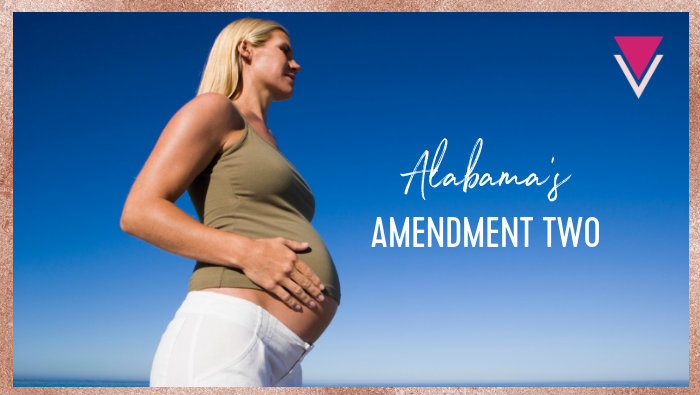Out of respect to the diversity of beliefs and values among our supporters and team members, Birth Monopoly has never publicly addressed the issue of abortion. We have chosen to make an exception to that policy to write about a current event that is inextricably linked to pregnancy and birth. We ask that readers engage in this discussion with respect and compassion.
In November 2018, Alabama passed an amendment to its constitution making it state policy to recognize and support “the sanctity of unborn life and the rights of unborn children, including the right to life,” as well as to “ensure the protection of the rights of the unborn child in all manners and measures lawful and appropriate.” The amendments also stated that “nothing in this Constitution secures or protects a right to abortion or requires the funding of an abortion.” (Read it here.)
What this describes is called “fetal personhood.” While this concept is generally associated with efforts to outlaw abortion, fetal personhood also directly impacts the rights of women carrying fetuses at any stage from conception on. (Throughout this article, I will use the medically accurate term “fetus” to describe a baby that is not yet born). Let’s take a closer look at the concept and its implications on wanted pregnancies and births.
Fetal personhood means that a fetus is a person with a set of rights that is separate from the person carrying them. This idea exists outside the U.S. constitution, as fetuses are not included in what we understand to be legal persons. Various states, however, have advanced policies and law that view fetuses as legal people with constitutional rights, with Alabama’s new amendment perhaps the strongest law to date. When this happens, the fetus, which cannot speak for itself, must be represented by someone, and that representative is invariably NOT the person carrying the fetus. Once a fetus has rights endowed by the state, the state is empowered to act on behalf of the fetus—or, in cases we have seen around the country for decades, doctors and hospitals act on behalf of the fetus against the mother, with the blessing of the state.
Although the language in Amendment Two was ostensibly written to apply to abortion, the wording is so broad that it extends state and medical authority over every stage of pregnancy and birth, potentially including how and where women give birth. In a state like Alabama, women’s rights during childbirth in hospitals are already ignored on a massive scale. It was only in 2017, after a years-long battle, that the legislature agreed to decriminalize and license Certified Professional Midwives, creating a legal pathway for home birth in Alabama. On both of these fronts—how to give birth and where to give birth—the “safety of the baby” is the central argument, with medical, hospital, and physicians’ groups positioning themselves as the authorities on this question. So far, they have successfully restrained women’s rights and options in practice and in law WITHOUT an actual legal basis for fetuses being their own people with a set of constitutional rights. Amendment Two provides them with not only a strong legal basis, but what could be interpreted as a requirement to impose their preferences on the bodies, choices, and options of pregnant people.
As an example, a physician who does not care for vaginal birth after Cesarean might impose a repeat Cesarean on a patient who wishes to have a vaginal birth with the argument that a Cesarean is safest for the fetus, and it is the physician’s legal duty to act on behalf of the fetus. In this case, the woman’s right to decide how she gives birth is immaterial versus the doctor’s state-supported mandate. This scenario is neither far-fetched nor imaginary. It has already happened prior to the amendment, both in and outside of Alabama, and now physicians like these are in a significantly stronger legal position to act thusly in future.
There are many more scenarios made legally possible by an amendment such as this, including:
- Prosecuting a woman who has a stillbirth for any type of behavior that is seen as risk-increasing, such as taking anxiety medications or choosing alternative therapies over medical treatment
- Compelling a pregnant person to have an induction or Cesarean at an arbitrary deadline; removing her newborn into state custody if she refuses
- Prosecuting a woman for an accidental home birth and/or removing the newborn from the family into state custody
- The state medical association challenging the constitutionality of the newly passed midwifery legislation on the grounds that hospital birth is safer for babies
- Prosecuting a pregnant woman for leaving the state to give birth as “kidnapping” or “appropriating” a fetus
It is important to note that there is no objective scientific basis for the actions in any of these scenarios, but that might not be necessary when so much weight is given to the opinions of those who are considered authorities, now supported by state policy.
Caroline Malatesta, the mother who suffered a permanent nerve injury after being wrestled to her back and her baby held in during birth, said:
“When I took my hospital to court, they argued over and over again that they had the right to make decisions about my birth because they were looking out for my baby–as if they cared more about him than I did! I am so worried that this amendment makes it that much harder for moms in Alabama to protect their babies from what we know is some of the most outdated maternity care in the country.”
Here are some other perspectives from Alabama-based advocates who have on-the-ground experiences with these issues:
Safer Birth in Bama, an organization that works to increase access to care, improve outcomes, and inform citizens about issues surrounding the maternity care crisis in Alabama, does not take an official stance on abortion, but says:
“Amendment Two has given us great cause for concern about matters related to safe birth. The wording is vague enough that it could be used to make a woman’s choices in childbirth secondary, regardless of how safe and reasonable they may be, if they are contrary to the plan of the health care provider. It could potentially be used to force women into certain courses of action based on the safety of the baby and doesn’t give clear consideration for the safety of the mother. Now, more than ever, it is going to be important for women to choose a provider that they can trust. In a state where our cesarean rates are high, our preterm birth rates are astronomical, and our infant mortality ranks at the bottom of the list, we encourage all families to be vigilant and educated consumers.”
Courtney Sirmon, former president of the Alabama Birth Coalition, disagrees that a state constitutional amendment like Amendment Two restricts women’s federal constitutional rights, but has concerns it might be misapplied by medical professionals unfamiliar with how state and federal law interact. She says:
“It needs to be clear that this amendment does not give a woman any less power to exercise her right for birthing choices. I saw a nurse on Facebook this morning say ‘maybe we can’t say it’s your decision anymore.’ This misinformed power and thinking is truly my concern. It is the possibility of a false interpretation of power that could be an unintended consequence of this amendment.'”
Katie Terry is a self-described pro-life conservative, a consumer of midwifery services, and a doula working on the team to open Alabama’s first freestanding birth center. She says she feels “unprotected” on a personal and professional level:
“This vague language will leave a gap for medical professionals and legislators to make decisions for women on whether or not they are being ‘safe’ with their unborn child. It is broader than just abortion. I was told by a senator who is also an OB/GYN that I was a ‘terrible mother for putting the safety of my children at risk by delivering them outside a hospital.’ That senator could use this amendment against me because his opinion was that I was putting my babies in harm’s way by using a Certified Professional Midwife. Professionally, I worry about our birth center, using this to scare doulas out of practicing, or preventing alternative birth locations to develop. I’m afraid we need to put our plans [for the birth center] on hold and figure out how this will affect us.”
Jesanna Cooper is an OB/GYN, educated, trained, and practicing in Alabama. She says:
“I am saddened by the passage of Amendment Two. The broad language takes decision making capabilities out of the hands of pregnant women, completely undermining my physician/patient relationships and the processes of informed consent and shared decision making. I am also concerned that it will further exacerbate Alabama’s maternal mortality crisis by not acknowledging the life of the mother. Ectopic pregnancy, previable rupture of membranes and chorioamnionitis are just a handful of situations where the life of the mother may be in question while a fetal heartbeat remains. Personal health decisions are complicated and nuanced with many shades of grey. They should not be made by the Alabama State Legislature.”
It remains to be seen how Alabama’s Amendment Two impacts wanted pregnancies and birth. Some people are optimistic that the state and state actors (medical professionals who are required to report to and act on behalf of the state) will not abuse the intent of the amendment by restricting the rights and options of people carrying wanted pregnancies. Based on everything we have seen in Alabama, from legislative and courtroom battles to the testimony of hundreds of people harmed by maternity care services there, we do not consider it rational to place this kind of trust in its state government or medical community.
We invite readers to keep us posted on what you see on the ground (please contact us here) and wish Alabamians the best navigating this new landscape.

A former communications strategist at a top public affairs firm in Baltimore, Maryland, Cristen Pascucci is the founder of Birth Monopoly, co-creator of the Exposing the Silence Project, and former vice president of the national consumer advocacy organization Improving Birth. In that time, she has run an emergency hotline for women facing threats to their legal rights in childbirth, created a viral consumer campaign to “Break the Silence” on trauma and abuse in childbirth, and helped put the maternity care crisis in national media. Today, she is a leading voice for women giving birth, speaking and consulting around the country on issues related to birth rights and options, and working on a documentary about mistreatment of birthing women.


